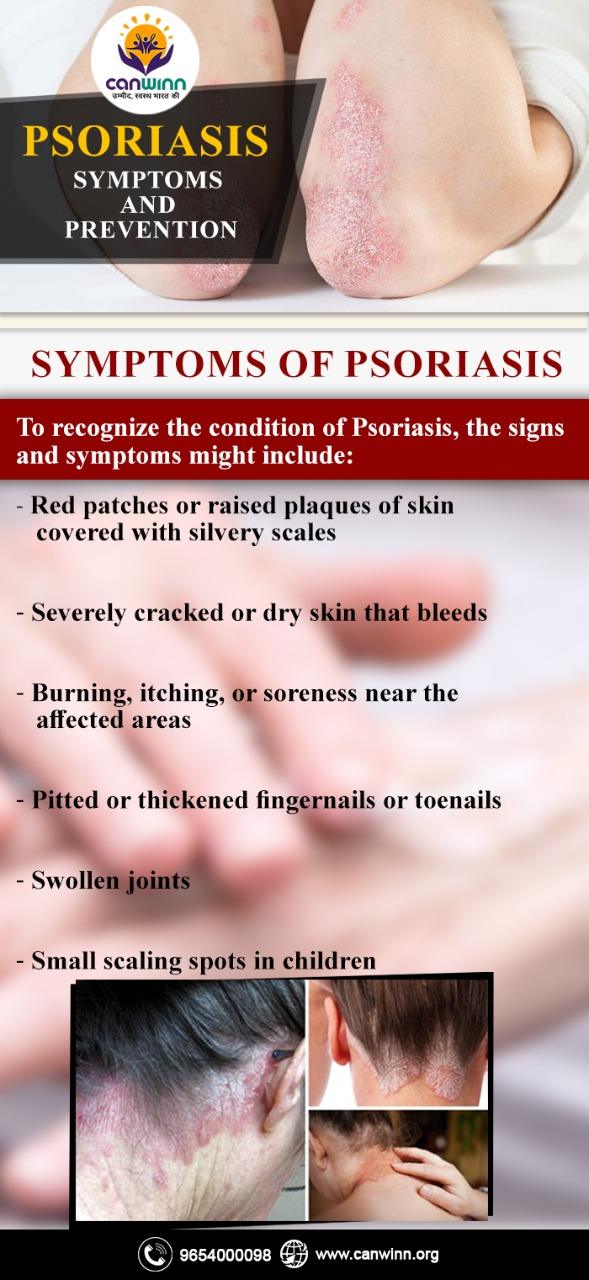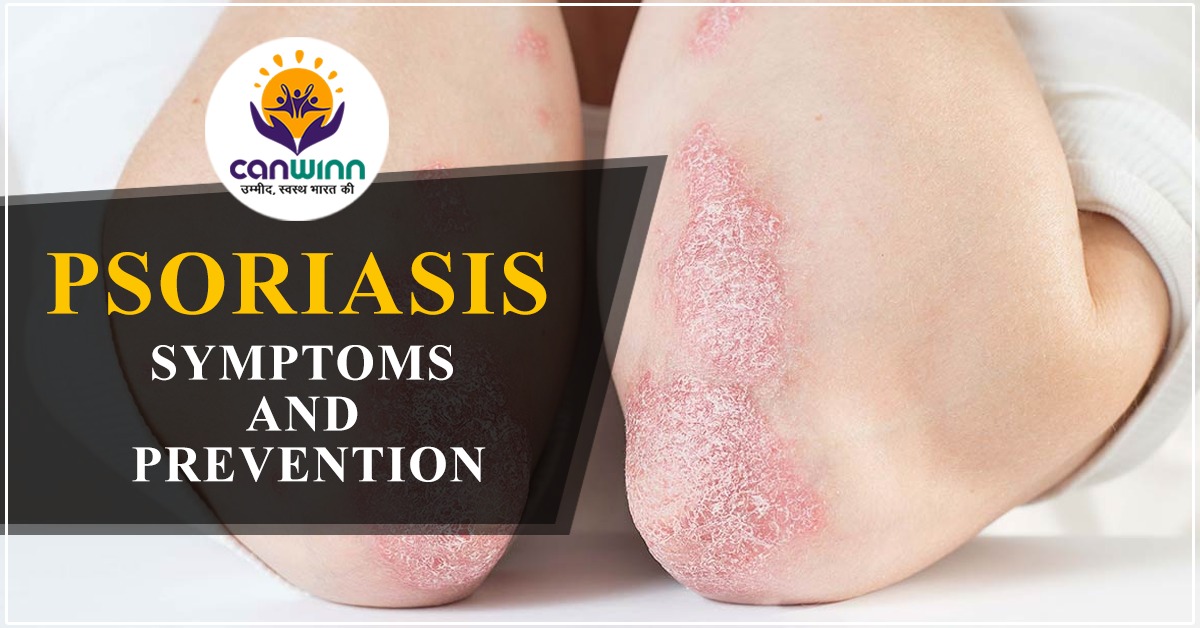A condition of psoriasis is something that do not cause any pain, but it is uncomfortable and bad in appearance. Psoriasis Symptoms directly affects the skin and causes swollen and raised skin along with red, itchy patches on elbows, trunk, knees, and scalp.
Furthermore, there are also different types of psoriasis. The condition has no permanent cure. This chronic disorder involves abnormal skin cells grow very rapidly. Psoriasis Symptoms is a disease that becomes worse with time and may develop an appearance of silvery scales.
Today, Canwinn Foundation will talk about Psoriasis symptoms and its preventions.
What are the Psoriasis Symptoms?
To recognize the condition of Psoriasis, the signs and Psoriasis Symptoms might include:
- Red patches or raised plaques of skin covered with silvery scales
- Severely cracked or dry skin that bleeds
- Burning, itching, or soreness near the affected areas
- Pitted or thickened fingernails or toenails
- Swollen joints
- Small scaling spots in children
What Are the Types of Psoriasis?
Generally, there are five types of Psoriasis Symptoms and each type shows different signs. Nonetheless, people experience a single type of psoriasis at one time.
Plaque Psoriasis
This kind of psoriasis includes symptoms like
- Raised red plaques
- Cracked plaques that bleed
- The silvery-white buildup of dead skin cells
Guttate Psoriasis
This kind of psoriasis includes symptoms like
- Small, round spots called papules
- Strep throat
Inverse Psoriasis
This kind of psoriasis includes symptoms like
- Inflamed patches of skin
- Red lesions in the skin
- Feeling of irritation due to inverse psoriasis
Pustular Psoriasis
This kind of psoriasis includes symptoms like
- White blisters of pus on hands or feet
- Bright-red skin
- Sickness and exhaustion
- Fever
- Chills
- Severe itching
- Rapid pulse
- Loss of appetite
- Muscle weakness
Erythrodermic Psoriasis
This kind of psoriasis includes symptoms like
- Fiery redness and exfoliation of the skin
- Severe itching and pain
How to Prevent Psoriasis from Spreading?
Unfortunately, there is no way to cure psoriasis permanently. However, you can prevent it from spreading. In short, the measures to reduce your risk of psoriasis.
Some measures to reduce your uncertainty of psoriasis include:
- Take daily baths
- Keep skin moisturized
- Avoid triggers if you can
- Get a small amount of sunlight each day
Preventive Measures of Psoriasis in Detail:
Reduce stress
Continuous stress causes a negative impact on health and makes diseases worse. Thus, it is definitely bad for people with psoriasis. So, you can reduce the levels of stress with the help of:
- Psychotherapy.
- Yoga.
- Meditation and relaxation techniques.
Avoid Certain Medications
The medicines that can affect your immune system by interfering in the autoimmune response and causing inflammation should be avoided. These kinds of medicines like lithium, antimalarial drugs, Inderal (Hemangeol), can easily trigger psoriasis.
Note: Always consult your doctor before stopping or starting any medication.
Prevent Skin Injuries
Skin injuries are recorded to trigger psoriasis in some cases. Injuries like sunburn and scratches are responsible to trigger. This is called a Koebner phenomenon.
Therefore, you can take care of your skin in order to trigger any worse condition.
Tips to protect your skin:
- use sunscreen and wear a hat
- wear long sleeves while gardening in sunlight
- apply bug spray while sitting outdoors
Koebner phenomenon can be successfully treated if it is detected early.
Avoid Infections
Infections throw stress on the immune Psoriasis Symptoms which eventually leads to inflammatory reactions. Any skin infections, earaches, tonsillitis, or respiratory infections can increase psoriasis.
Tips to prevent infections:
- Frequently, wash your hands
- Avoid sharing food, drinks, or eating utensils
- Stay away from the people who are sick
Consume a Healthy Diet
Obesity can make psoriasis worse. Therefore, follow a healthy lifestyle to stay away from any disease.
Avoid Foods That Can Cause Inflammation Like:
- red meat
- dairy
- high-fat foods
- processed foods
- refined sugars
- tomatoes, potatoes, and peppers
- citrus fruits
Foods that you should eat:
- fatty fish including salmon and tuna
- Walnuts and almonds
- Flax seeds and pumpkin seeds
- Green leafy vegetables, such as spinach and kale
In conclusion, while there is no cure for Psoriasis Symptoms, but you should always seek medical attention for Psoriasis treatment. Relieving in symptoms will surely reduce the condition from worsening. Thus, you can prevent psoriasis from spreading. Eat healthily, and stay safe! Check this article also on linkedin.
For more details call Canwinn Foundation on the helpline number 9654000098!



